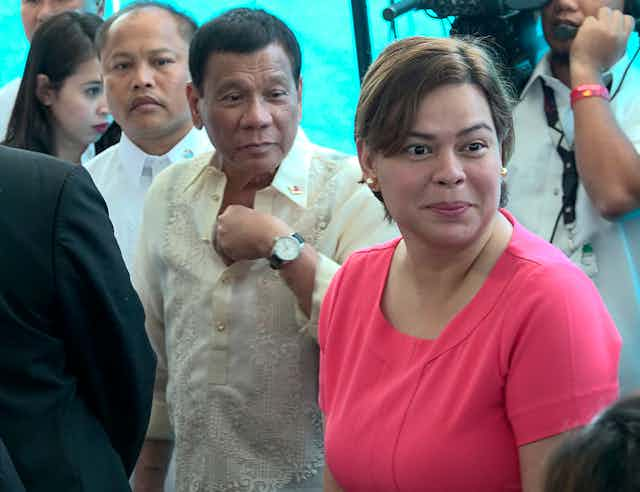Shortly before she finished her term of office on June 15, the ICC’s outgoing chief prosecutor Fatou Bensouda offered hope to victims, human rights groups and opposition of the regime of Rodrigo Duterte in the Philippines, when she called for a full investigation into its suspected crimes against humanity. The “war on drugs” waged by the president of the Philippines has killed more than 20,000 people according to neutral observers and caused untold damage to a nation with a recent history of violent dictatorship and a culture of corruption and impunity.
Unlike Ferdinand Marcos, who was able to fly safely into exile in Hawaii with his wife, selected cronies and a billion dollars’ worth of loot, Duterte doesn’t enjoy the same level of international protection, so will have to rely on his local cronies. But there are lots of them, plenty of whom are entrenched in positions of power. These cronies owe him everything and include his daughter Sara who may even become his successor in the presidential palace if she runs for election in 2022.
Public trust in the Philippines police and military and confidence in the ability of democratic institutions to resist the next authoritarian leader will take a generation to rebuild. But the election next year will have been decided before the ICC’s investigation reports. So it’s the election, rather than the ICC that will determine the future direction of Philippines society. The omens aren’t good.
Likely successors
Candidates are beginning to come forward for next May’s elections and include some of the usual faces from the Philippines’ most influential family dynasties, including the Marcoses. But the big issue will be whether a candidate is pro or anti-Duterte.
The opposition desperately needs to unite under a single figure and the current vice-president, Leni Robredo is an outstanding candidate. Elected on a separate ballot under the Philippines’ constitution, Robredo has been a constant thorn in Duterte’s side, a brave beacon of liberal progressive leadership

Meanwhile the pro-Duterte camp is quite crowded. Celebrities, including the boxer Manny Pacquiao or Marcos’s son, Ferdinand, or “Bongbong” as he is known, are likely to have to wait it out if Sara Duterte is anointed by her father, as many expect. Sara is hardly likely to allow any cooperation with an ICC investigation into her father. She’s equally unlikely to undermine his legacy or revoke his brutal flagship policies that have left so many families grieving with no sense that the justice system offers any accountability.
Broken system
Filipino political analyst Julio Teehankee has repeatedly warned that the broken system matters more than the personalities. Duterte came to power on a promise to clean up politics, but the system has become further compromised by rampant corruption and endemic crony capitalism. Meanwhile, a politicised military and police force has led to an increasingly militarised form of governance. This will all take substantial reform programmes to rectify.
Duterte promised to “destroy the oligarchs” and replace the rule of “imperial Manila” with a new model of federalism to localise governance. Instead, he promoted his own oligarchs and scrapped his federalist agenda, which aimed to move central power away from Manila and localise administrative politics.

To be fair, federalism would have been just as likely to cement the power of local clans as it would be to empower local populations. But Duterte has broken any promises he made that could have changed things for the better. And, more tragically, he kept those promises that have brought death, misery and destruction. The electorate can thus be forgiven for having little faith in the next candidate that offers grand visions.
Will the ICC case become an election issue?
If the important thing is locking up Duterte, then by all means rejoice at the prospect of an ICC investigation. But if the prospects of a better system for the people of the Philippines is the key concern, then it’s the election that matters most. And it’s worth considering how an ICC investigation running in parallel with an election would work – and to whose benefit.
Duterte’s supporters will make much of the ICC’s track record, which is often accused of Eurocentrism or even outright racism for its track record of mainly pursuing Africans to prosecute. Branding an ICC investigation into Duterte as yet another inquiry on a developing nation is sure to play well for his successors and their supporters.
The timing of Bensouda’s announcement also raises questions. The drug war has been on her radar since 2016 when she warned she was “deeply concerned” at the enormous death toll. So why leave this to her last week in office and throw it to her replacement, Karim Kahn? The ICC now has 120 days to issue a decision as to whether or not to proceed with a full investigation. That decision, and the potential for an investigation (with which the Philippines government is unlikely to cooperate), will happen during one of the most critical elections of a generation. Intentional or not, the timing is a political grenade.
Either way, the ICC can be ignored for now, left to do its thing and hopefully find its teeth to give the people of the Philippines the justice and accountability they need to move on and heal from Duterte’s reign of terror. More importantly now, all attention needs to be placed on what is actually in the hands of the Filipino people – their chance to vote in less than a year with their future at stake.

